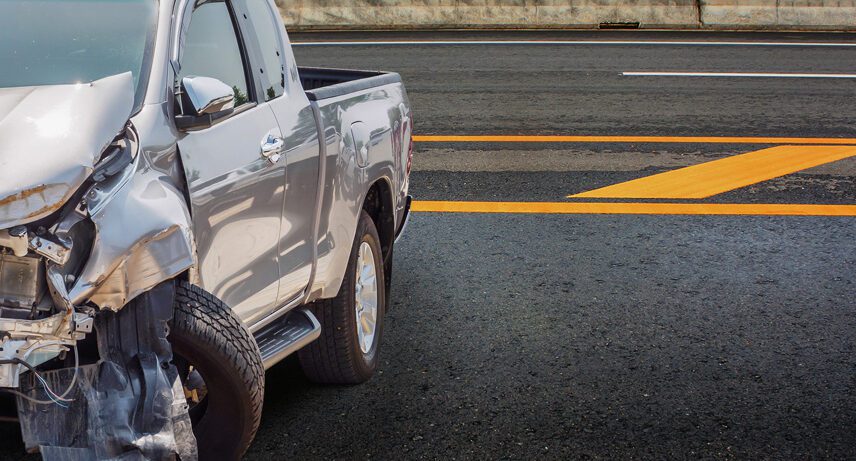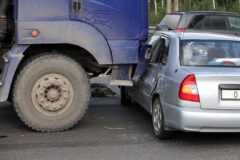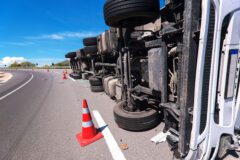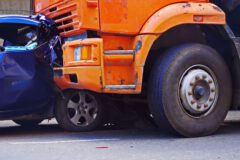How Are Truck Accidents Different Than Car Accidents?

Motor vehicle accidents can be scary and overwhelming, but when it comes to truck accidents, things can get even more complicated. With their massive size and weight, commercial trucks present unique challenges when it comes to determining liability, calculating damages, and navigating the legal system.
If you or someone you know has been involved in a truck accident, it’s important to understand the differences between truck and car accidents. In this comprehensive blog post, we’ll take a closer look at these differences and provide valuable insights for victims, their families, and anyone interested in gaining a deeper understanding of the complexities of truck accident cases.
Severity of Injuries and Damages
Due to their size and weight, truck accidents often result in more severe injuries and extensive property damage compared to car accidents. The force of impact from a collision involving a large truck can be devastating, leading to catastrophic injuries, long-term disabilities, and even fatalities.
For instance, a car that’s rear-ended by a fully loaded semi-truck may experience significant damage, with its occupant sustaining severe whiplash, spinal cord injuries, or traumatic brain injuries. Consequently, the medical expenses, rehabilitation costs, and potential loss of income associated with truck accidents are typically far higher than those which occur in car accidents.
Multiple Parties Involved
Truck accidents usually involve more than just two parties, unlike car accidents. Along with the truck driver, there may be other parties that could be responsible, like the trucking company, vehicle manufacturers, maintenance providers, and cargo loaders.
In order to determine who’s at fault, thorough knowledge of the trucking industry’s regulations and standards is essential for any investigator to possess. For example, if there are issues with the brakes on the truck, the manufacturer or maintenance provider could also be held responsible, not just the driver.
Complex Regulations
To guarantee public safety, the trucking industry is subject to extensive regulation. Commercial trucks must adhere to specific rules and requirements set by federal and state laws, covering areas such as driver qualifications, weight restrictions, maintenance protocols, and hours of service limitations.
It’s essential to understand these regulations and the ways in which they can be violated to build a strong legal case in the event of a truck accident. Lawyers with expertise in truck accident litigation can navigate these complex regulations and hold the responsible parties accountable. For instance, if a truck driver is found to have exceeded the maximum hours of service without proper rest breaks, this could lead to driver fatigue and increase their liability.
Insurance Coverage
Truck accidents can lead to catastrophic damages and severe injuries, which is why insurance coverage for these incidents is typically quite steep. By law, commercial trucking companies must hold substantial insurance policies to offer compensation in case of accidents.
Additionally, dealing with insurance companies can be challenging as they have their own legal teams and adjusters working tirelessly to minimize their financial responsibility. To safeguard your rights throughout the insurance claim process, it is highly recommended to seek the guidance of a highly skilled truck accident attorney. A lawyer can advocate for you and negotiate with the insurance company to secure the maximum compensation you are entitled to.
Unique Accident Reconstruction Challenges
When it comes to reconstructing truck accidents, there are unique challenges to consider. Given the large size and weight of commercial trucks, the dynamics of these accidents can differ from those involving cars. Experts in accident reconstruction may need to analyze factors like skid marks, braking distance, and road conditions to determine what caused the accident and who’s liable.
Additionally, retrieving and preserving data from the truck’s black box, which records important information like speed and braking patterns, may be necessary to get a clear picture of what happened leading up to the accident. Other forms of evidence, such as maintenance reports, truck driver hours-of-service logs, cargo loading manifests, and truck company hiring or screening records, may also be needed after a trucking accident.
Visibility and Size Differences
The operation of trucks requires a higher level of skill and attention due to their size and weight. Compared to standard passenger vehicles, commercial trucks are significantly longer, taller, and heavier. This means that truck drivers must remain vigilant of blind spots, make wider turns, and allow for more distance to slow down or come to a stop. Disregarding these key differences can lead to severe accidents and potential harm to individuals on the road.
Maintenance
Commercial trucks demand a higher level of maintenance than personal vehicles due to their complex mechanical systems and frequent use on the road. These vehicles are equipped with a multitude of moving parts that are exposed to intense wear and tear over a short period of time.
As a result, truck drivers and trucking companies have a significant responsibility to perform regular maintenance and inspection to ensure the safety and reliability of their vehicles. Neglecting to do so can lead to catastrophic consequences, such as truck accidents, for which the driver and company may be held legally responsible.
Conclusion
Truck accidents present unique challenges compared to car accidents, including the severity of injuries, involvement of multiple parties, complex regulations, higher insurance coverage, and unique accident reconstruction considerations.
If you or a loved one has been involved in a truck accident, it’s crucial to seek legal representation from an experienced truck accident attorney who understands the nuances between trucking accidents and car accidents.






